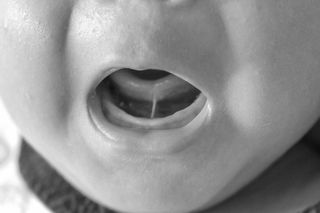
How Infant Tongue Tie Became the Most Controversial Breastfeeding Complication Few Have Heard Of
“I have never examined the undersurface of the [baby’s] tongue as a routine [until recently],” a pediatrician said.

When Megha Kanera’s son was diagnosed with a tongue tie at 45 days of age, she was apprehensive about the surgical revision recommended by her lactation consultant. Both pediatricians whom she approached for a second opinion rubbished the breastfeeding-tongue tie link. “Nobody seems very concerned about this topic honestly,” she says.
Tongue tie — or more formally, ankyloglossia — is a congenital condition marked by an unusually short, tight frenulum, the band of tissue that anchors the tongue to the floor of the mouth. Depending on the case, a short frenulum can restrict tongue function to varying degrees.
While its occurrence ranges from 3% to 16% worldwide, the condition is an overlooked complication in an Indian scenario. A study by Cloudnine Hospital, Bengaluru, published in Indian Pediatrics, revealed an incidence of only 0.52% among 25,786 babies born across three private hospitals in the city (2007 to 2015).
Diagnosable at birth, tongue tie has been associated with breastfeeding trouble, given the tongue’s role in latching and suckling. Symptoms of this for an infant include difficulty latching, an inability to feed continuously, excessive or inadequate weight gain, and digestive issues. Mothers of such children describe their breastfeeding experience as uncomfortable or painful, with physical symptoms like persistently sore/cracked nipples and frequent bouts of mastitis and abscesses.
Yet tongue tie’s relation to breastfeeding difficulty is disputed, and the effectiveness of its only solution is in question. Some say the debate is only because research hasn’t caught up to prove what many mothers and neonatal health professionals already know.
*
India’s seemingly low incidence rate is linked with the larger problem of inadequate lactation support. Many cases of breastfeeding difficulty slip under the radar as mothers, often overwhelmed by guilt, are reluctant to talk about it. When they are, clinical support is usually limited to moral support, says Effath Yasmin, a Mumbai-based, International Board Certified Lactation Consultant (IBCLC) and filmmaker of the documentary Untying Breastfeeding, which investigates the subject.
“If you have a lactation consultant round the clock, you’ll probably diagnose as many tongue ties as the Western countries,” says Dr. Kishore Kumar, neonatologist and founding chairman of Cloudnine Hospital.
According to “What Does the World Think of Ankyloglossia?,” an online survey of health professionals working with cases of neonatal tongue ties, Western clinicians were more likely than their Asian counterparts to acknowledge a connection between tongue tie and breastfeeding difficulties. Furthermore, nursing and allied health professionals – such as speech therapists, physiotherapists, pediatric dieticians, and/or bodyworkers — were more likely than doctors to agree to the link.
Health practitioners attribute these divides to a lack of formal education on the subject: Although modern ultrasonography technology offers a better understanding of oral restrictions in the breastfeeding process, recent findings are yet to be incorporated into standard medical school curricula in India.
“Though I have been in the field, I have never examined the undersurface of the tongue as a routine [until recently],” says Bangalore-based retired pediatrician and lactation consultant Dr. Asha Benakappa, who has been part of India’s breastfeeding movement for more than three decades.
Related on The Swaddle:
The Complicated Link Between Breastfeeding, Postpartum Weight Loss
Mumbai-based physician and lactation consultant Dr. Manisha Gogri says this lack of awareness often lead pediatricians to assume lactation consultants are over-identifying the condition. Lactation consultants — whose professional ethics stipulate they cannot make medical diagnoses, making them reliant on pediatric support — say they’re just more likely to notice tongue tie.
In a country with more than 70,000 births per day, time can be a challenge for many pediatricians and neonatologists. This doesn’t leave much room to support breastfeeding difficulties, which can take up to three hours of observation per consultation. Currently, the health workers leading the field of neonatal tongue tie are from the periphery of a core medical team – lactation consultants, pediatric dentists, craniosacral therapists, and others.
Experts agree that a holistic, multidisciplinary approach to diagnosis is necessary – one that merges the peripheral attendants’ input with primary health care providers’ official diagnosis and guidance. But even if that is achieved, the way forward is still disputed.
*
Studies like Cloudnine’s confirm that a frenotomy, or tongue tie revision – a surgical procedure wherein the frenulum is cut to restore tongue mobility – can help alleviate breastfeeding-related problems. It can be conducted by a doctor using a pair of scissors, scalpel or laser technology. However, the procedure’s necessity is widely contested.
The concern is understandable given the tender age of the child involved — in cases of breastfeeding issues, a frenotomy is usually advised in the initial months after birth. “A doctor expects us to do all else before recommending surgery,” says Dr. Gogri, explaining how some tongue-tied babies manage to breastfeed successfully with alternative breastfeeding positions and by improving the mother’s milk supply.
“Not every infant requires a surgery; releases are based on functional impact and not just an anatomical presence,” says Dr. Shifa Arshad, a Coimbatore-based preventive pediatric dentist. Parents must be educated on how a timely frenotomy can help avoid future functional issues related to breathing and sleep, she adds. Her work with neonatal frenotomies has been questioned by the local pediatric community whom, she says, is indifferent to her attempts at a dialogue on the subject.
Drs. Kumar and Gogri state that fair judgment and experience is essential to case selection, which in turn determines frenotomy success rates. Yasmin speaks of timing a frenotomy well, “not by the age but by looking at how and where that baby is in their feeding issues and other issues around it.”
“Until we have all the pieces of the puzzle in place, just quickly diagnosing tongue releases doesn’t help.”
Experts say a frenotomy’s effectiveness is also dependent on pre- and post-op care. This includes addressing issues like birth trauma, infant breast refusal, a mother’s milk supply issues and re-lactation, and post-op latching training, establishing rehabilitation exercises, and monitoring cases after the surgery.
“Until we have all the pieces of the puzzle in place, just quickly diagnosing tongue releases doesn’t help,” says Dr. Gogri.
*
Internationally, neonatal tongue ties have been a hot-button topic for ages. What could pre-empt the debate in India, or unite both camps, is cold, hard scientific evidence — but research is lacking.
Cloudnine’s report remains among a few, if not the only, relevant studies in the country. Drs. Arshad and Gogri highlight the ethical dilemma involved in a randomized controlled trial (the gold standard for the approval of any medical process or drug): the people involved – mothers and newborns — are at an exceptionally vulnerable time. Arshad also poses the challenge of funding for research that is mostly being pursued at an individual level.
In the absence of research, other capitalistic interests have been able to sway the narrative around tongue tie and frenotomy.
Yasmin mentions formula companies that employ non-monetized benefits to influence doctors’ attitudes to breastfeeding and thereby, their product; indirectly, breastfeeding complications including tongue tie may get overlooked. Similarly, Arshad recalls an anti-frenotomy article – funded by a breast pump company – shared on professional pediatric groups.
At the same time, there is a looming incentive to let the frenotomy dominate any discussion of treating tongue tie – a current scenario in countries like Australia and the U.S., which are grappling with a state of overdiagnosis. While this is partly due to greater awareness around the benefits of breastfeeding, it’s difficult to say there’s been no commercial influence. “There’s a lot of money involved with lasers, and people are investing. As soon as lasers came in the world scenario, the number of frenotomies quickly doubled,” says Yasmin. Frenotomy training by premier institutes in the West is often funded by laser companies, she adds.
*
Amid competing interests and a lack of research, parents like Kanera are at risk of getting lost in the cracks, and babies possibly missing out on a treatment that anecdotally improves life for everyone. Kanera ultimately opted for a frenotomy for her son — “In two-three days [after laser surgery], the latch improved tremendously, and I was able to feed till he was over a year,” she says – but other parents may not feel so comfortable making a decision in the face of conflicting, expert guidance.
While health professionals don’t foresee the gap in India’s neonatal tongue tie divide bridging anytime soon, progress is underway.
Related on The Swaddle:
Can Indian Moms Breastfeed in Public Without Being Shamed?
Better knowledge has helped Dr. Benakappa to diagnose six neonatal tongue ties (of 100 cases) since last November. And Dr. Arshad sees four to five incidents of neonatal tongue ties per week compared to five to 10 a month three years ago. She credits this to better-informed lactation consultants and referrals via online support groups. Dr. Gogri mentions instances where doctors send in more cases after seeing positive results.
Recently, the Breastfeeding Promotion Network of India (BPNI) introduced a tongue tie segment to its lactation support and management training program. But Dr. Gogri, secretary of BPNI Maharashtra, says similarly focussed training initiatives haven’t percolated into pediatric and gynecological organizations.
Drs. Arshad and Benakappa also suggest that screening newborns for a tongue tie be made part of the initial neonatal check-up – much like the internationally recognized Apgar Score.
And all advise judicious diagnosis and treatment.
“We need to have a balanced approach and have alternatives ready for parents,” Dr. Gogri says. “Ultimately, they are going to decide what is best for their baby and for themselves.”
Gretchen Ferrao Walker is an editorial consultant who has collaborated with Indian and international publications like GQ India, Forbes India, Time Out, Architectural Digest India, National Geographic Traveller India, Design Anthology and Collectively.org. She is the former editor of travel bimonthly Time Out Explorer and current mum to a 2-year-old. She enjoys embroidering and making pictures.
Related


Should We All Quit Sugar? Maybe Not.
